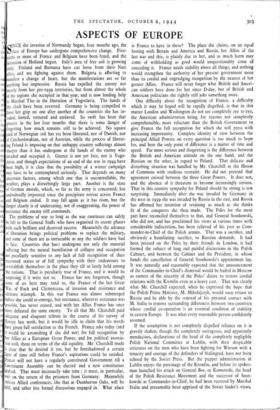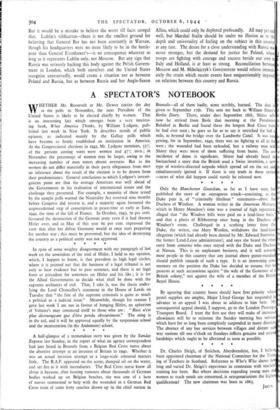ASPECTS OF EUROPE
0INCE the invasion of Normandy began, four months ago, the ula, 0 face of Europe has undergone comprehensive change. Five- sixths or more of France and Belgium have been freed, and the i:',eration of Holland begun. Italy's area of free soil is growing daily. Finland and Rumania have cut loose from their Nazi allies, and are fighting against them. Bulgaria is affecting to ifest a change of heart, but the manifestations are so far anything but impressive. Russia has expelled the enemy not merely from her pre-1939 territories, but from almost the whole of the regions she occupied in that year, and is now lending help to Marshal Tito in the liberation of Yugoslavia. The hands of the clock have been reversed. Germany is being compelled to loose her grip on one after another of the countries she has in- vaded, looted, tortured and enslaved. So swift has been that process in the last four months that there is some danger of forgetting how much remains still to be achieved. No square yard of Norwegian soil has yet been liberated, nor of Danish, nor of Czechoslovakian, nor of Austrian, while the process of liberat- ing Poland is imposing on that unhappy country sufferings almost sharper than it has undergone at the hands of the enemy who invaded and occupied it. Greece is not yet free, nor is Yugo- slavia, and though expectations of an end of the war in 1944 have been high, it is clear that the possibility of a winter campaign may have to be contemplated seriously. That depends on many uncertain factors, among which one that is uncontrollable, the weather, plays a disturbingly large part. Another is the state of German morale, which, so far as the army is concerned; has undoubtedly improved -since the precipitate retreat across France and Belgium ended. It may fall again as it has risen, but the danger clearly is of underrating, not of exaggerating, the power of resistance the enemy still commands.
The problems of war so long as the war continues can safely be left to the General Staffs who have organised its recent phases with such brilliant and deserved success. Meanwhile the advance of liberation brings political problems to replace the military, and some of them are as intractable as any the soldiers have had to face. Countries that have undergone not only the material suffering but the mental humiliation of collapse and occupation are peculiarly sensitive to any lack of full recognition of their recovered status or of full sympathy with their endeavours to re-establish themselves in the place they till so lately held among the nations. That is peculiarly true of France, and it would be surprising if it were not so. France has not forgotten, though some of us here may tend to, the France of the last Great War, of Foch and Clemenceau, of invasion and resistance and ultimate triumph. In this war France was almost submerged before she could re-emerge, but resistance, wherever resistance was possible, has never ceased, and with her Allies France has once more defeated the same enemy. To all that Mr. Churchill paid adequate and eloquent tribute in the course of his survey of Europe last week, but it would be idle to claim that his words have given full satisfaction to the French. France asks today (and it would be astonishing if she did not) for full recognition by her Allies as a European Great Power, and for political associa- tion with them on terms of the old equality. Mr. Churchill made it clear that he desired it too, but he foreshadowed a certain lapse of time still before France's aspirations could be satisfied. France will not have a regularly constituted Government till a Constituent Assembly can be elected and a new constitution drafted. That must necessarily take time ; it must, in particular, Wait on the return of the prisoners from Germany. Meanwhile various Allied conferences, like that at Dumbarton Oaks, will be held, and other less formal discussions engaged in. What place is France to have in these? The place she claims, on an equal footing with Britain and America and Russia, her Allies of the last war and this, is plainly due to her, and as much harm may come of withholding as good would unquestionably come of conceding it. France needs stability above all things, and nothing would strengthen the authority of her present government more than its cordial and ungrudging recognition by the nearest of her greater Allies. France will never forget what British and Ameri- can soldiers have done for her since D-day, but of British and American politicians she rightly still asks something more.
One difficulty about the recognition of France, a difficulty which it may be hoped will be rapidly dispelled, is that in this matter London and Washington do not see completely eye to eye, the American administration being, for reasons not completely comprehensible, more reluctant than the British Government to give France the full recognition for which she will press with increasing importunity. Complete identity of view between the principal Allied Powers on every question is too much to hope for, and here the only point of difference is a matter of time and speed. Far more serious and disquieting is the difference between the British and American attitude on the one hand, and the Russian on the other, in regard to Poland. That delicate and disturbing situation was handled by Mr. Churchill in the House of Commons with studious restraint. He did not pretend that agreement existed between the three Great Powers. It does not, and the absence of it threatens to become increasingly serious. That in this country sympathy for Poland should be strong is not surprising. Immediately after she was invaded by Germany in the west in 1939 she was invaded by Russia in the east, and Russia has affirmed her intention of retaining as much as she thinks fit of the conquests she then made. The Poles for the most part have reconciled themselves to that, and General Sosnkowski, who did not, and has proclaimed his views at various times with considerable indiscretion, has been relieved of his post as Com- mander-in-Chief of the Polish armies. That was a sacrifice, and obviously a humiliating sacrifice, to Russian demands. It had been pressed on the Poles by their friends in London, it had formed the subject of long and painful discussions in the Polish Cabinet, and between the Cabinet and the President, in whose hands the cancellation of General Sosnkowski's appointment lay. It was naturally and reasonably expected that the announcement of the Commander-in-Chief's dismissal would be hailed in Moscow as earnest of the sincerity of the Poles' desire to restore cordial relations with the Kremlin even at a heavy cost. That was clearly what Mr. Churchill expected, when he expressed the hope that the Polish Prime Minister, M. Mikolajczyk, would soon return to Russia and be able by the renewal of his personal contact with M. Stalin to remove outstanding differences between two countries whose cordial co-operation is an essential condition of stability in eastern Europe. It was what every reasonable person confidently assumed.
If the assumption is not completely dispelled reliance on it is gravely shaken, though the completely outrageous, and apparently mendacious, declarations of the head of the completely negligible Polish National Committee at Lublin, with their despicable strictures on the men who have been fighting for Warsaw with a tenacity and courage of the defenders of Stalingrad, have not been echoed by the Soviet Press. But the puppet administration at Lublin enjoys the patronage of the Kremlin, and before its spokes- man launched his attack on General Bor, or Komoroski, the head of the Polish Resistance Movement and the successor of Sosn- kowski as Commander-in-Chief, he had been received by Marshal Stalin and presumably been apprised of the Soviet leader's views. But it would be a mistake to believe the worst till facts compel that. Lublin's vilification—there is not The smallest ground for believing that General Bor has not been constantly in Warsaw, though his headquarters were no more likely to be in the battle- zone than General Eisenhower's—is no consequence whatever so long as it represents Lublin only, not Moscow. But any sign that Russia was seriously backing this body against the Polish Govern- ment in London, which both ourselves and the United- States recognise unreservedly, would create a situation not as between Poland and Russia, but as between Russia and her Anglo-Saxon Allies, which could only be deplored profoundly. All may yet end well, but Marshal Stalin should be under no illusion as to tb depth and universality of feeling on the subject in this country at any rate. The desire for a close understanding with Russia was never stronger, but the demand for justice for Poland, whose troops are fighting with courage and success beside pur own k Italy and Holland, is at least as strong. Reconciliation between Moscow and M. Mileolajczyk's Government would relieve immed ately the strain which recent events have unquestionably imposed on relations between this country and Russia.



























 Previous page
Previous page